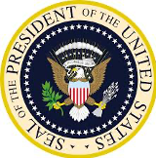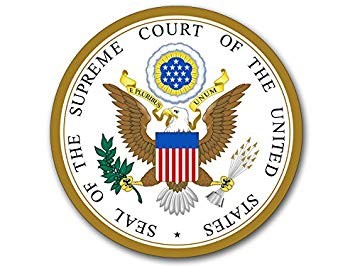 White House
White House
A growing number of people connected to the White House have tested positive for the coronavirus. Known positives in this growing cluster of cases as of this writing include the President and First Lady, members of Congress, White House staff and advisors, GOP officials, Trump campaign staffers, members of the press and members of the public who attended recent White House events.
Plain language:
- President Trump has the coronavirus.
What it means to you:
- The health of the President and other elected officials impacts how our government functions. A virus outbreak within party and campaign staff impacts how a campaign can function.
Action Steps:
 U.S. Supreme Court
U.S. Supreme Court
Senate Majority Leader Mitch McConnell (R-KY) and Senate Republicans continue to pursue the swift confirmation of Judge Amy Coney Barrett, President Donald Trump's nominee to replace Justice Ruth Bader Ginsburg as Associate Justice on the United States Supreme Court. Public hearings are planned to begin on Monday, October 12th, with a confirmation vote by November 3rd. Senate Judiciary Committee members Mike Lee of Utah and Thom Tillis of North Carolina have tested positive for COVID-19, part of the White House cluster, though it is unclear if their health will change the timeline for hearings. Currently, 51 Republican Senators have indicated that they support voting on Judge Barrett's nomination without delay, with Senators Lisa Murkowski (R-AK) and Susan Collins (R-ME) joining Democrats in calling for results of the Presidential election before moving forward with filling the late Justice Ginsburg's seat.
AUCD has released a statement opposing the nomination of Judge Barrett to the U.S. Supreme Court due to her well-evidenced hostility to the constitutionality of the Affordable Care Act (ACA): "AUCD supports previous Supreme Court rulings upholding the constitutionality of the ACA, and affirms the Court's decisions that any changes to the Act be legislative and not judicial," said John Tschida, executive director of AUCD. "Repeal of the ACA would negatively and disproportionately impact people with disabilities, especially people of color, who are overrepresented in the Medicaid population." The Supreme Court is scheduled to consider a case challenging the constitutionality of the ACA beginning November 10th.
Plain language:
- The Senate is moving forward with Judge Amy Coney Barrett's nomination to the Supreme Court. AUCD does not support her nomination because she has said she would make a ruling to get rid of the Affordable Care Act.
What it means to you:
- Judge Amy Coney Barrett is likely to be confirmed to the Supreme Court and it is very possible that the Affordable Care Act will be repealed. Millions of people with disabilities and their families would lose health care access and protections if the ACA is repealed.
Action Steps:
- Read AUCD's statement opposing the nomination of Judge Barrett to the Supreme Court.
- Learn more about the process of picking a Supreme Court Justice with our Plain Language guide.
- Read a synopsis of Judge Barrett's record on issues affecting people with disabilities from the Bazelon Center for Mental Health Law.
- Learn about the upcoming Supreme Court Case on the ACA, California v. Texas.
- Read the Amicus Brief on the case from the disability community, including AUCD.
- Each U.S. Senator has a vote in the confirmation. You can share your thoughts with both of your Senators. Email or call the Capitol Switchboard at (202) 224-3121 (voice) or (202) 224-3091(tty) and ask to be connected to your Senators.
- You can also use this easy tool to find your Senators.
 National Disability Call
National Disability Call
You are invited to a national disability call to address the vacant seat on the Supreme Court, the threat to the Patient Protection and Affordable Care Act (ACA) and the Disability Community.
Featuring:
- Senator Bob Casey (PA)
- Senator Patty Murray (WA)
- Senator Tammy Duckworth (IL)
- Jeiri Flores, University of Rochester Strong Center for Developmental Disabilities
Moderator:
- Rylin Rodgers, Director of Public Policy, Association of University Centers on Disabilities
When: Tuesday, October 6, 2020
Time: 10:30-11:00 a.m. EDT
Platform: Zoom
No registration necessary; just follow this link:
https://zoom.us/j/94595939171?pwd=LytpRDN4RC81SWZaYVkvc0R2elVIUT09
 COVID-19
COVID-19
The House of Representatives passed HEROES 2.0, a $2.2 trillion version of the HEROES Act the House passed in May, in a narrow 214-207 vote. The vote was primarily considered a symbolic gesture considering the ongoing negotiations between Speaker Nancy Pelosi (D-CA) and the White House, and Senate Republicans' continued refusal to consider a bill above $1 trillion. The House is now on recess until November 16th.
Plain language:
- The House of Representatives passed a bill for COVID-19 relief but it will most likely not become a law. Speaker Pelosi and the White House are still trying to work together on a compromise.
What it means to you:
- While HEROES 2.0 includes some funding to support people with disabilities, it is no guarantee that a COVID-19 relief bill agreed on by Democrat and Republicans will include it. You can call or email Congress to tell them about how COVID-19 has changed your life, for example your housing, services, health, school, or work. Every call and email matters.
Action Steps:
 COVID-19 Vaccine
COVID-19 Vaccine
The National Academies of Sciences, Engineering, and Medicine published their 'Framework for Equitable Allocation of COVID-19 Vaccine," which recommends how potential COVID-19 vaccine(s) should be distributed in the United States. The Framework is intended to guide the U.S. Department of Health and Human Services and state, tribal, local, and territorial authorities to ensure equitable access to the COVID-19 vaccine through 4 distribution phases. Of note to the disability community, Phase 1 of their vaccine allocation plan includes people of all ages with comorbid and underlying conditions that put them at significantly higher risk of COVID-19, as well as older adults in congregate care settings. Phase 2 includes people with disabilities in group homes and staff who work in such settings.
Plain language:
- Scientists and public health officials are working on a plan for giving people a COVID-19 vaccine so that if one becomes available they are ready.
What it means to you:
- Many people with disabilities have medical conditions that could make COVID-19 especially bad if they get it. It is important that people with disabilities and the people around them get a COVID-19 vaccine to stay safe and healthy.
Action steps:
 Appropriations
Appropriations
The Continuing Appropriations Act, 2021, And Other Extensions Act (P.L.116-94) was passed last week and signed into law to fund the federal government through December 11th, 2020, avoiding a potential government shutdown. The Act primarily extends funding levels of fiscal year 2020 appropriation bills, and also includes funding for child nutrition assistance and farm payments that had been sticking points in negotiations. Lawmakers may negotiate a more robust appropriations bill in the 'lame duck' Congressional session between the election on November 3rd and the start of the new Congress on January 21st.
Plain language:
- The government has the funding to stay open until December 11th. Congress and the President will need to work together to pass funding for the rest of the fiscal year.
- "Fiscal" means about taxes and spending. The fiscal year begins on October 1st and goes to September 30th of the next year.
What it means to you:
- Appropriations laws decide the funding for different government programs and services, including those that support education, healthcare, job training, housing, and more.
Action steps:
- Learn more about the Continuing Appropriations Act:
- Learn more about the appropriation process from AUCD.
 Presidential Campaign 2020
Presidential Campaign 2020
Vice President Mike Pence and Democratic Vice Presidential nominee Senator Kamala Harris (D-CA) will participate in the Vice Presidential Debate on Wednesday, October 7th, from 9 to 10:30 p.m. EST. It will be held at The University of Utah in Salt Lake City, Utah, and moderated by Susan Page of USA Today. The debate will be broadcast on all major networks and their corresponding streaming channels, as well as on C-SPAN.
What this means to you:
- The Vice Presidential debate is a chance to learn more about the platforms of each Presidential ticket and to think about who you want to vote for in November.
More ways to learn:
 Voting 2020
Voting 2020
Election Day is Tuesday, November 3rd! Early and mail-in voting has started in many states, and in several states the final day to register to vote is TODAY. If we're going to make an impact in every election, we have to be registered to vote and have a plan to vote. Now is the time to decide if you will vote by mail or in-person, and make a plan. Many states have started early voting and mail-in voting, so make your voting plan today!
Tools:
Action steps:
 U.S. Department of Education
U.S. Department of Education
The U.S. Department of Education's Office for Civil Rights (OCR) issued a technical assistance document on September 28, 2020. The document is intended to assist elementary and secondary (K-12) schools with meeting their obligations under Federal civil rights laws.
Action steps:
 Policy Talk
Policy Talk
"I think what made our efforts so successful was that they were led by individuals with disabilities. We brought provider agencies and state entities to the table, but ultimately people with disabilities were the ones leading the effort."
This week on AUCD Policy Talk, Mat Rice, a disability advocate and the Public Policy Specialist for People on the Go of Maryland, celebrates the end of subminimum wage 14(c) waivers for people with disabilities in Maryland with a look into how this landmark achievement came about.
Action steps:
 Tuesdays with Liz
Tuesdays with Liz
In this week’s Vintage #TWL Part 1/2, Liz discusses the process of choosing a new Supreme Court Justice with former AUCD Executive Director Andy Imparato. It is important to understand HOW a Supreme Court Justice is chosen so that we can have our voices heard in the process.
*Note: When the video was filmed in 2016, the Senate needed 60 votes to confirm a Supreme Court Justice. Due to a rule change in 2017, the Senate now only needs 50 votes to confirm a Supreme Court Justice.
